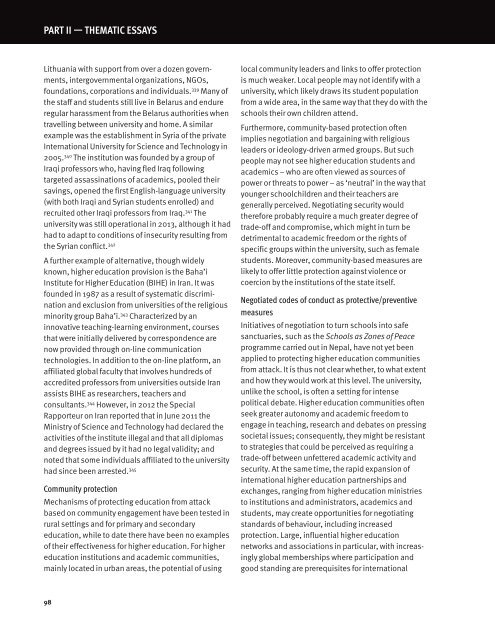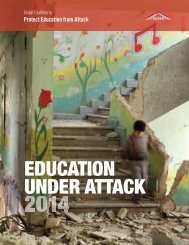Create successful ePaper yourself
Turn your PDF publications into a flip-book with our unique Google optimized e-Paper software.
PART II — THeMATIC eSSAYS<br />
Lithuania with support from over a dozen governments,<br />
intergovernmental organizations, NGOs,<br />
foundations, corporations and individuals. 339 Many of<br />
the staff and students still live in Belarus and endure<br />
regular harassment from the Belarus authorities when<br />
travelling between university and home. A similar<br />
example was the establishment in Syria of the private<br />
International University for Science and Technology in<br />
2005. 340 The institution was founded by a group of<br />
Iraqi professors who, having fled Iraq following<br />
targeted assassinations of academics, pooled their<br />
savings, opened the first English-language university<br />
(with both Iraqi and Syrian students enrolled) and<br />
recruited other Iraqi professors from Iraq. 341 The<br />
university was still operational in 2013, although it had<br />
had to adapt to conditions of insecurity resulting from<br />
the Syrian conflict. 342<br />
A further example of alternative, though widely<br />
known, higher education provision is the Baha’i<br />
Institute for Higher Education (BIHE) in Iran. It was<br />
founded in 1987 as a result of systematic discrimination<br />
and exclusion from universities of the religious<br />
minority group Baha’i. 343 Characterized by an<br />
innovative teaching-learning environment, courses<br />
that were initially delivered by correspondence are<br />
now provided through on-line communication<br />
technologies. In addition to the on-line platform, an<br />
affiliated global faculty that involves hundreds of<br />
accredited professors from universities outside Iran<br />
assists BIHE as researchers, teachers and<br />
consultants. 344 However, in 2012 the Special<br />
Rapporteur on Iran reported that in June 2011 the<br />
Ministry of Science and Technology had declared the<br />
activities of the institute illegal and that all diplomas<br />
and degrees issued by it had no legal validity; and<br />
noted that some individuals affiliated to the university<br />
had since been arrested. 345<br />
Community protection<br />
Mechanisms of protecting education from attack<br />
based on community engagement have been tested in<br />
rural settings and for primary and secondary<br />
education, while to date there have been no examples<br />
of their effectiveness for higher education. For higher<br />
education institutions and academic communities,<br />
mainly located in urban areas, the potential of using<br />
local community leaders and links to offer protection<br />
is much weaker. Local people may not identify with a<br />
university, which likely draws its student population<br />
from a wide area, in the same way that they do with the<br />
schools their own children attend.<br />
Furthermore, community-based protection often<br />
implies negotiation and bargaining with religious<br />
leaders or ideology-driven armed groups. But such<br />
people may not see higher education students and<br />
academics – who are often viewed as sources of<br />
power or threats to power – as ‘neutral’ in the way that<br />
younger schoolchildren and their teachers are<br />
generally perceived. Negotiating security would<br />
therefore probably require a much greater degree of<br />
trade-off and compromise, which might in turn be<br />
detrimental to academic freedom or the rights of<br />
specific groups within the university, such as female<br />
students. Moreover, community-based measures are<br />
likely to offer little protection against violence or<br />
coercion by the institutions of the state itself.<br />
Negotiated codes of conduct as protective/preventive<br />
measures<br />
Initiatives of negotiation to turn schools into safe<br />
sanctuaries, such as the Schools as Zones of Peace<br />
programme carried out in Nepal, have not yet been<br />
applied to protecting higher education communities<br />
from attack. It is thus not clear whether, to what extent<br />
and how they would work at this level. The university,<br />
unlike the school, is often a setting for intense<br />
political debate. Higher education communities often<br />
seek greater autonomy and academic freedom to<br />
engage in teaching, research and debates on pressing<br />
societal issues; consequently, they might be resistant<br />
to strategies that could be perceived as requiring a<br />
trade-off between unfettered academic activity and<br />
security. At the same time, the rapid expansion of<br />
international higher education partnerships and<br />
exchanges, ranging from higher education ministries<br />
to institutions and administrators, academics and<br />
students, may create opportunities for negotiating<br />
standards of behaviour, including increased<br />
protection. Large, influential higher education<br />
networks and associations in particular, with increasingly<br />
global memberships where participation and<br />
good standing are prerequisites for international<br />
98



